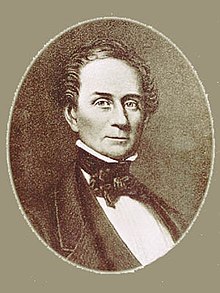Henry Johnson (Louisiana politician)
| Henry Johnson | |
|---|---|
 |
|
|
United States Senator from Louisiana |
|
|
In office January 12, 1818 – May 27, 1824 February 12, 1844 – March 4, 1849 |
|
| Preceded by |
William C.C. Claiborne Alexander Porter |
| Succeeded by |
Dominique Bouligny Pierre Soulé |
| Member of the U.S. House of Representatives from Louisiana's 1st district | |
|
In office September 25, 1834 – March 3, 1839 |
|
| Preceded by | Edward Douglass White, Sr. |
| Succeeded by | Edward Douglass White, Sr. |
| 5th Governor of Louisiana | |
|
In office December 13, 1824 – December 15, 1828 |
|
| Preceded by | Henry S. Thibodaux |
| Succeeded by | Pierre Derbigny |
| Personal details | |
| Born |
September 14, 1783 Davidson County, Tennessee |
| Died | September 4, 1864 (aged 80) Pointe Coupee Parish, Louisiana |
| Political party | Democratic-Republican, National Republican, Whig |
| Spouse(s) | Elizabeth Key |
| Religion | Episcopalian |
Henry Johnson (September 14, 1783 – September 4, 1864) was an attorney and politician, the fifth Governor of Louisiana (1824-1828). He also served as a United States Representative and as a United States Senator.
Johnson was born in Virginia in September 1783. His family is said to have resided in southern Virginia, where Johnson completed academic study and became a member of Virginia Bar.
After passing the bar, Johnson married Elizabeth Key of Virginia, a daughter of Philip B. Key and his wife; Elizabeth's father was a cousin of Francis Scott Key. The couple had a family together.
Several years after the United States made the Louisiana Purchase, the Johnsons moved to the Territory of Orleans, in 1809. He was appointed as Clerk of the Second Superior Court of the Territory. In 1811, he was appointed Clerk of the newly formed St. Mary Parish in the southwestern part of the state.
In 1812, Johnson lost a bid to the U.S. Congress. After his defeat, he practiced law in Donaldsonville, Louisiana, located on the south bank of the Mississippi River in the south-central part of the state. He became a district judge of the Ascension Parish Court in 1811; and was selected as a delegate to the first State constitutional convention in 1812.
Upon the death of U.S. Senator William C.C. Claiborne in 1818, Johnson was elected by the state legislature as a Democratic-Republican to fill his vacancy. He served as Chairman, Senate Committee on Indian Affairs, in the 17th Congress. In 1823, he was elected by the Louisiana State Legislature as an "Adams Republican," also known as the National Republican Party candidate, to a full six-year US Senate term. The Party asked him not to run for Governor in 1824, as it wanted to retain control of that Senate seat.
...
Wikipedia
